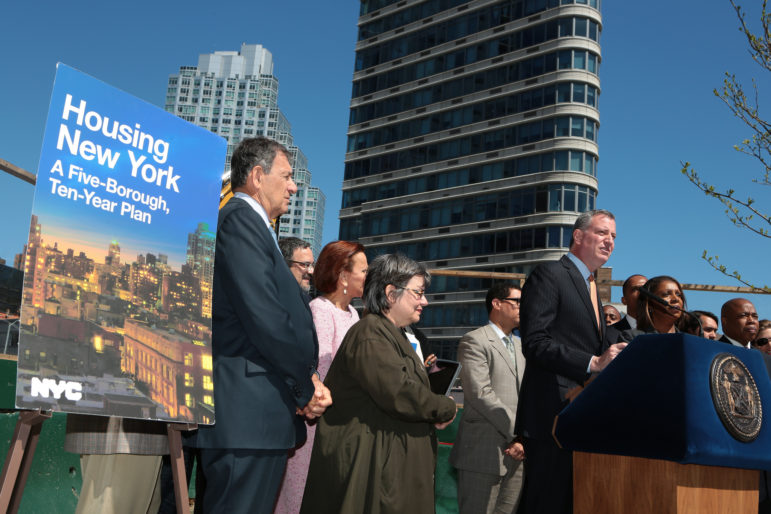‘Supportive housing has been notably absent from most mayoral candidate housing discussions in spite of the fact that our homelessness crisis is the worst on record – and that it disproportionately impacts Black and brown New Yorkers. It is time for that to change.’

Ed Reed for the Office of Mayor Bill de Blasio
Mayor de Blasio at a housing press conference in 2014.While New York City’s homelessness emergency may seem an intractable crisis, the reality is that we already know how to solve it: by providing our chronically homeless neighbors with permanent supportive housing. Originally conceptualized in the 1980s, supportive housing is affordable housing with on-site services for those facing the largest systemic barriers to permanent housing, including those struggling with serious mental health diagnoses, substance abuse disorder, and HIV/AIDS. In the more than 30 years since, it is proven not just to be the most effective tool to end chronic homelessness, but also a simple way to bolster the economy and enrich communities.
Despite this clear track record of success, supportive housing has been notably absent from most mayoral candidate housing discussions in spite of the fact that our homelessness crisis is the worst on record – and that it disproportionately impacts Black and brown New Yorkers. It is time for that to change. The next New York City mayor will shape housing policy in the five boroughs for the next decade, and supportive housing must be an essential component of his or her plan.
That starts with a clear promise to expand capital investment for affordable housing to $4 billion annually, as outlined in the United for Housing plan. Such a bold financial commitment would not just help fund the creation of desperately needed new supportive homes, but also help preserve the supportive housing created in decades past – much of which is located in high-opportunity neighborhoods where new construction is often rare.
To that end, land use will be a key issue facing the next administration. Current practices empower small numbers of community members and elected officials to make life-changing decisions regarding supportive housing while those who would most benefit do not have a seat at the table. Combined with antiquated zoning and land use policies that are rooted in white supremacy, much of the city is off-limits to development, let alone for supportive housing. It will require real moral courage to overcome these barriers, but it can be done.
Policies regarding land use and development, however, are only part of the equation for supportive housing, which was created and continues to be run by mission-based nonprofits. Tight financial margins and inadequate city contracts have left many operators on the brink: even before the pandemic made it worse, a study found that nonprofit human service organizations’ average cash reserves covered only two weeks of expenses and operating margins were just 1 percent.
This directly impacts the service workers in supportive housing, who are mostly women of color – and who are predominantly underpaid. Supportive housing is a critical tool that helps those whom systemic failures in housing, health care, and criminal justice have failed. It is an essential service, but it is equally essential to ensure that those who operate its services are paid what they are worth. To make this happen, the next administration should conduct a comprehensive study of human service wages across sectors, including nonprofit, government and for-profit employers and a full array of job titles to ensure the people who risked their lives for others during the pandemic are paid a decent wage as we emerge from it.
The election of the next mayor is an incredible opportunity for New York to transform its city for the better. Housing has become a foundational issue of the campaign. Now we need to take that conversation to the next level by focusing on the supportive housing that can end chronic homelessness – if the next mayor is bold enough to commit to our roadmap.
Laura Mascuch is the Executive Director of the Supportive Housing Network of New York.








One thought on “Opinion: Supportive Housing is the Missing Piece from the Mayoral Housing Conversation”
Fantastic goods from you, man. I’ve understand your stuff previous to and you’re just extremely great.
I really like what you have acquired here, certainly like what
you are saying and the way in which you say
it. You make it enjoyable and you still care for to keep it smart.
I can’t wait to read far more from you. This is actually a tremendous site.